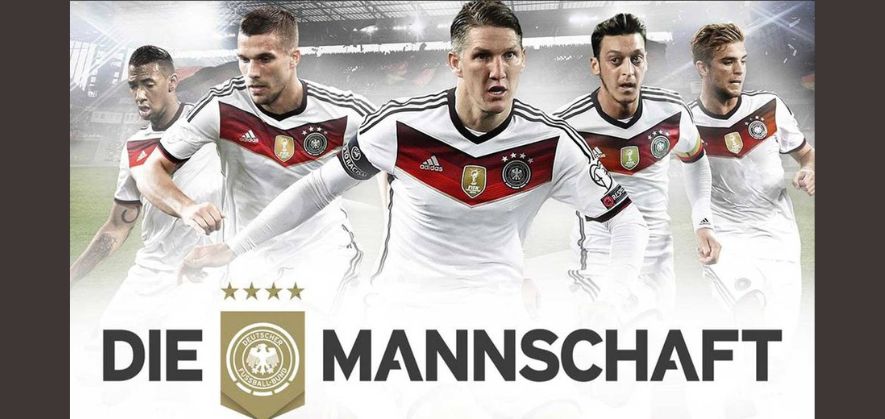occer is home to many unique terms and colloquialisms that not everyone following the sport is familiar with.
If you’ve only just started keeping tabs with the game, there are bound to be a few words and phrases that pass you by.
Worry not, because that’s okay!
After all, you can’t be expected to grasp every concept that the sport has to offer right from the moment you start to get acquainted with it.
This blog seeks to be a comprehensive informational hib that can answer questions for readers who are new to the game, as well as shed light on the more complex topics that even the seaseoned veterans have trouble understanding.
But today, this article will focus on the former.
More particularly, we will be looking at the meaning of the word “Die Mannschaft”, which pops up in soccer’s social circles every now and then.
So, let’s start by cutting right to the chase.
Die Mannschaft is the name of Germany’s national soccer team and it literally means “the team” in the German language.
What does die Mannschaft mean?
Now let’s break this popular phrase down into bits and pieces so you can grasp its meaning in an easier way.
First of all, “mann” simply refers to man in the singular form.
Quite straightforward, right?
And then when you take the German noun ending “schaft” – which means “ship”, you get the word “man-ship”.
This is basically a collective of men, similar to the way a ship has a crew of workers who perform different roles to ensure that the vessel remains on course and arrives at its final destination.

Therefore, “mannschaft” denotes a collective of men working together to achieve a unified purpose, otherwise known as a team.
How do you pronounce die Mannshcaft?
One of the last things you’d want as a soccer fan is to be laughed at for mispronouncing one of the game’s many terminologies.
Being the butt end of the banter certainly isn’t fun!
Here’s a short audio recording that demonstrates exactly how this phrase should be said.
When was Germany’s soccer team first called die Mannschaft?
The term became mainstream after the nation won the FIFA World Cup back in 2014.
If you watched the final that day, you’ll probably remember Mario Götze’s incredible finish that sealed the trophy for Germany.
Here’s a video recapping this exact moment:
Following that success, the country underwent a rebrand a year later, which included a change to the soccer team’s logo as well as the cementing of its nickname.

Here’s a quote which supports this:
“Germany on Monday launched their new logo, including the use of term ‘die Mannschaft’, in an effort to increase international branding of the hugely popular World Cup winners. Known in many countries by this term, meaning ‘team’ in German, the country wants to reinforce it with a reference on their equipment and a new logo which includes a fourth star for their fourth World Cup win last year.”
Source – Reuters
Are Germany still called die Mannschaft today?
Funnily enough, the nickname which became so popular after Germany’s World Cup success in 2014 is now rarely if ever used among soccer’s social circles.
People just call them Germany, you know!?
But the administrators behind the men’s national team recently decided to drop the name as a result of it drawing criticism and negative association from the people of Germany.
You probably remember Germany crashing out of the 2018 FIFA World Cup group stage in embarrassing fashion, and their disappointing round of 16 elimination at the European championships back in 2021.
Such results prompted further introspection from Germany’s top brass, who concluded that the name needed to be dropped because of its perceived arrogance as well as the thought that it didn’t respect other national teams that performed much better than Germany at the time.
Will it make a return?
Well, that definitely remains to be seen.
Perhaps if Germany win the 2022 FIFA World Cup this year!
Conclusion
This short article has covered what the die Mannschaft term means as well as offered insight into its origin.
Soccer is home to so many of these unique words and phrases and here at SoccerWhizz we’ve covered a bunch.
You can check out a similar article on the meaning of “anulo mufa” if you wish to explore more interesting phrases that are part and parcel of the game.
If you enjoy the content that I create and would like to buy me a coffee, then I’d really appreciate it!
Any money that I earn through this donation will be re-invested into more content for this website.
Additionally, by sending in a donation you’ll also receive a copy of my recently released 190+ page eBook on Soccer Ball Care, as well as be subscribed to our mailing list where you’ll be regularly informed on the latest developments concerning the Soccer Whizz blog.
- Future Icons: Europe’s Emerging Midfield Maestros Set for Glory - December 4, 2023
- Kickstarting a Revolution: How Soccer Transformed the United States Over the Last Four Years - October 7, 2023
- 4-1-4-1 Soccer Formation [Analysis] - September 23, 2023

